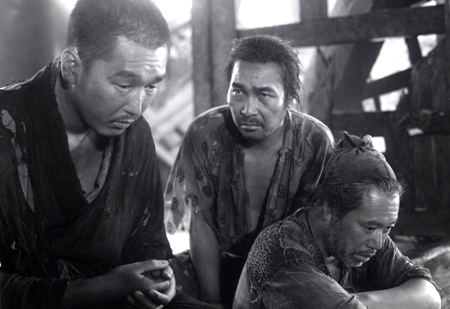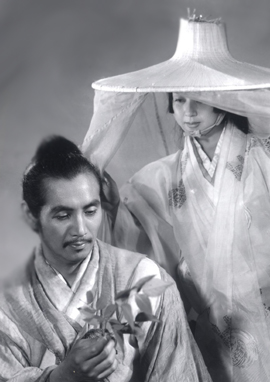
 |
|
|
|
American film culture in 1950 was largely centered in New York, where existed a handful of theaters that did an admirable job of showing import pictures that were simply not distributed on this side of the Atlantic. A look at the movie sections of the papers shows smallish art houses screening classics from France and Italy, with occasional titles sneaking in from other countries; politically suppressed movies like Give Us This Day were booked as well. It was a time when art moviegoing was an activity for highbrows or bohemians. The ratio of know-it-all film fans to ordinary civilians was far lower than it now. One of the first Japanese movies to make an impression big enough to see release in 'specialty' theaters across the country was Akira Kurosawa's Rashomon. Critics tagged it as a hands-down masterpiece from day one, a judgment that has never been challenged. The Criterion Collection put out a handsome DVD edition ten years ago, and has just released an even more stunning digital restoration in Blu-ray, with new extras. 
Rashomon is a small movie about the investigation into a deadly forest encounter between a Samurai, his wife and a notorious bandit. Much of it consists only of speeches delivered to the camera, yet it continues to entrance audiences. It became Kurosawa's international breakthrough film and has endured as a film school classic for its insights into the nature of cinema storytelling. Its 'testimonial flashbacks' are just as daring (and more faithful to human nature) as the flashback structure of Citizen Kane. The flashbacks to a tragic incident are framed in the eyewitness testimony, but the testimony is itself related as a second framing story. Waiting out a torrential rain under the ruined gate of the Rashomon temple, a woodcutter (Takashi Shimura) recounts shocking recent events. Three days before, a man was killed and his wife attacked. The bandit presumed responsible was captured. But during the trial, each of the participants and witnesses told a distinctly different story. How can justice function when establishing simple facts is so difficult? One of the most often screened of art-cinema films, Rashomon is too entertaining to be restricted to the narrow confines of film school. The story has action, intrigue, mystery and sex, not to mention excellent characterizations from its stars. Toshiro Mifune plays a variation on the rascal bandit role for which he's most loved. In the spate of Kurosawa remakes that followed The Magnificent Seven, Martin Ritt transposed Rashomon to the American West as The Outrage, with a woefully miscast Paul Newman as a Mexican bandit. The remake took place on phony interior sets, a change that makes Kazuo Miyagawa's great location photography look all the more magical. 
Most of Rashomon takes place in a verdant forest, under a canopy of high foliage that bathes the actors in moving patterns of dappled light. With the shadows of leaves always in motion, there's no such thing as a static shot. The images express a magical place alive with hot sunlight and soft shadows. When played out in the 'living' forest, the questionable testimonies of the witnesses take on a higher meaning. Whether the truth is altered by character or memory, the unchanging setting insists that the witnesses cannot alter nature. The truth is in the trees somewhere -- there are higher powers that will remember. Kurosawa softens his vision of humanity as a hell of selfish mendacity with a closing gesture towards loving charity. It's a very satisfying coda. The film-school lesson of Rashomon can be found in any textbook. The cinematic experience is different from a literary one because films always present an immediate reality, always in the present tense. Movies can fracture time with flashbacks, but they can't express ambiguity the way a book can -- a tree is either there, or it's not. By and large, psychological complexity must come from the written script (a literary, non-cinematic source) or the director must use symbols and allusions -- in effect, become more self-consciously arty. Rashomon's memory-flashbacks are simple enough until the accumulation of conflicting testimony creates an intellectual ambiguity. If these flashbacks lie, what kind of testimony, or memory, is reliable? Hitchcock tried a single false flashback in Stage Fright and just caused problems for himself when audiences decided he was 'cheating'. Rashomon's conflicting testimony innovation saw frequent use as a comic effect in later shows like the farce Les Girls. 
The epic-in-miniature poses an emotional puzzle when characters that are reserved or stoic in one testimony-episode are given completely different personalities in another episode. As the wife, Machiko Kyo shows a wide range of emotion, but Mifune's different 'angles' on the same bandit character are surprising as well. Finally, Takashi Shimura, the leader of the defenders in Seven Samurai, provides a solid spine in the moralistic framing story. The movie has the effect of a basic psychology test -- viewers come away with different ideas of what the intended "truth" might have been. Criterion's Blu-ray of Rashomon is more than a repeat of the older DVD package. The new HD transfer is a marked improvement, with an image that is cleaner, richer in contrast and even better framed. The dappled B&W images in the forest are so attractive, we see why Kurosawa opens the picture with an unbroken series of shots of a character just walking through the woods. The Academy of Motion Picture Arts and Sciences took part in the restoration, which began with a 4K feature scan. Criterion producer Kim Hendrickson augmented the older extra materials on the disc. Japanese film expert Donald Richie provides a commentary track and Robert Altman sat for a spirited video introduction (best avoided before seeing the picture). An excerpt from a well-researched Japanese television show centers on cinematographer Kazuo Miyagawa. The 70-minute documentary A Testimony as an Image gathers other cast and crew interviews about the movie. Star Takashi Shimura is heard on an audio interview, and a pair of trailers are included as well. There's an English dub track, which hopefully will only be used for comparison; it's what most Americans heard in the film's initial release. A fat booklet includes a chapter on this film from Akira Kurosawa's autobiography, and the entire text of the two short stories used to make Rashomon. The essay is by film historian Stephen Prince; the handsome package and booklet illustrations are by Kent Williams.
On a scale of Excellent, Good, Fair, and Poor,
Rashomon Blu-ray rates:
Reviews on the Savant main site have additional credits information and are often updated and annotated with reader input and graphics. Also, don't forget the 2011 Savant Wish List. T'was Ever Thus.
Review Staff | About DVD Talk | Newsletter Subscribe | Join DVD Talk Forum |
| ||||||||||||||||||